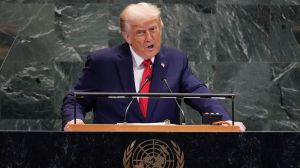‘Nepal PM learnt of sacking on son’s TV’
Nepal's Prime Minister learned he had been sacked by the King for the second time in a little over two years watching a small television in ...

Nepal’s Prime Minister learned he had been sacked by the King for the second time in a little over two years watching a small television in his 11-year-old son’s bedroom, along with most of his nervous Cabinet.
Two hours later, an Army officer ordered Sher Bahadur Deuba out of his plush official residence and he was placed under house arrest, guarded by heavily-armed police and banned from contacting anyone, at his sprawling private home in the hills overlooking Kathmandu, a few kilometres away.
Reappointed last year after being sacked in 2002 for failing to hold elections or to quell a bloody Maoist rebellion, Deuba had feared the King was about to seize power and sack him every day for the past three months, close aide and ruling party leader Minendra Rijal told Reuters.
Rijal said he was with Deuba in his son Jayaveer’s room as Deuba and his Cabinet watched King Gyanendra sack them in a national address on Tuesday and seize power despite the introduction of democracy in 1990.
|
Nepal Army ready to get tough on Maoists
|
|||||
|
• Nepal’s Army Chief |
|||||
Rijal has so far escaped joining hundreds of other political leaders and activists under house arrest, behind bars or on the run hiding from the King’s Army and police.
‘‘The security forces had been put on high alert the night before, but not by the Prime Minister or the Home Minister,’’ he said. ‘‘One minister said then ‘we have already lost power’.’’ Rijal said the first signs of a likely sacking surfaced three months ago and Deuba’s decision in mid-January to push ahead with national elections, delayed since his first sacking in late 2002, appeared to have sealed his fate. It was not entirely clear why Deuba’s election decision led to his ouster, but Rijal said: ‘‘The king told him once you recommend for elections your duty is over, your job is done.’’ Gyanendra also defied the advice of foreign governments, including major military allies India and the United States, in sacking Deuba, Rijal said.
‘‘After we (first) heard the rumours, we checked with many embassies and they all said if he has heard us right, he won’t do this,’’ he said. But he added Gyanendra is counting on foreign governments not wanting to help the Maoists by attacking him. India, the United States, the United Nations and the European Union have strongly criticised the King. All phone lines and Internet access have been cut in Nepal and the palace could not be contacted for comment. Gyanendra, after a nationally televised address on Tuesday, is issuing statements only through state radio.
The media has been banned for six months from criticising his actions and the Army stationed officers in every television station to scan broadcasts before they aired. Deuba has not been heard from since his arrest. His son, Jayaveer, is staying with Deuba’s in-laws and his wife was briefly allowed to visit him on Thursday, Rijal said.
For years, Nepal’s bitterly-divided and widely-derided political parties have been unable to make any progress in ending a bloody Maoist rebellion to overthrow the monarchy that has killed more than 11,000 people since 1996.
The Maoists say they only want to deal directly with the King, who wields ultimate power in the world’s only Hindu Kingdom, rather than an appointed government. Deuba’s sacking is seen partly as aimed at breaking a deadlock with the rebels.
But they also criticised his move and their next step is uncertain. While still unable to clinch a battlefield victory over government forces, they have made strong military gains recently and have blockaded Kathmandu by threat alone.
Gyanendra’s move also came after mounting criticism over his failure to bring stability—there have been four prime ministers in less than three years—and peace with the rebels,
On the eve of his sacking, Deuba was summoned after a recital by famous Indian flautist Hariprasad Chaurasia to meet the King, but insisted later it was nothing unusual, Rijal said. However, India’s Embassy, the biggest and most active in Kathmandu, immediately began asking questions about the meeting.
‘‘We were also told we might be rounded up on Monday night. The Prime Minister said ‘go home. If we are all going to be arrested, it’s better to be at home’. He said thank you for sticking with me. We don’t know what’s going to happen now.’’
Rijal said political parties would take on the King, probably calling massive protests when communications are restored, but also wanted to avoid weakening the monarchy or strengthening the Maoists.
— Reuters
Photos



- 01
- 02
- 03
- 04
- 05




























